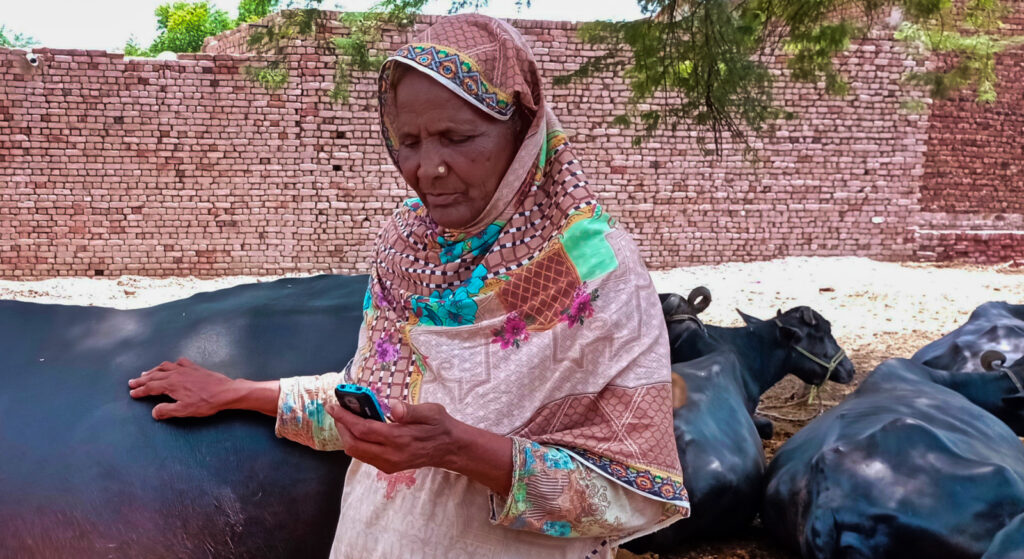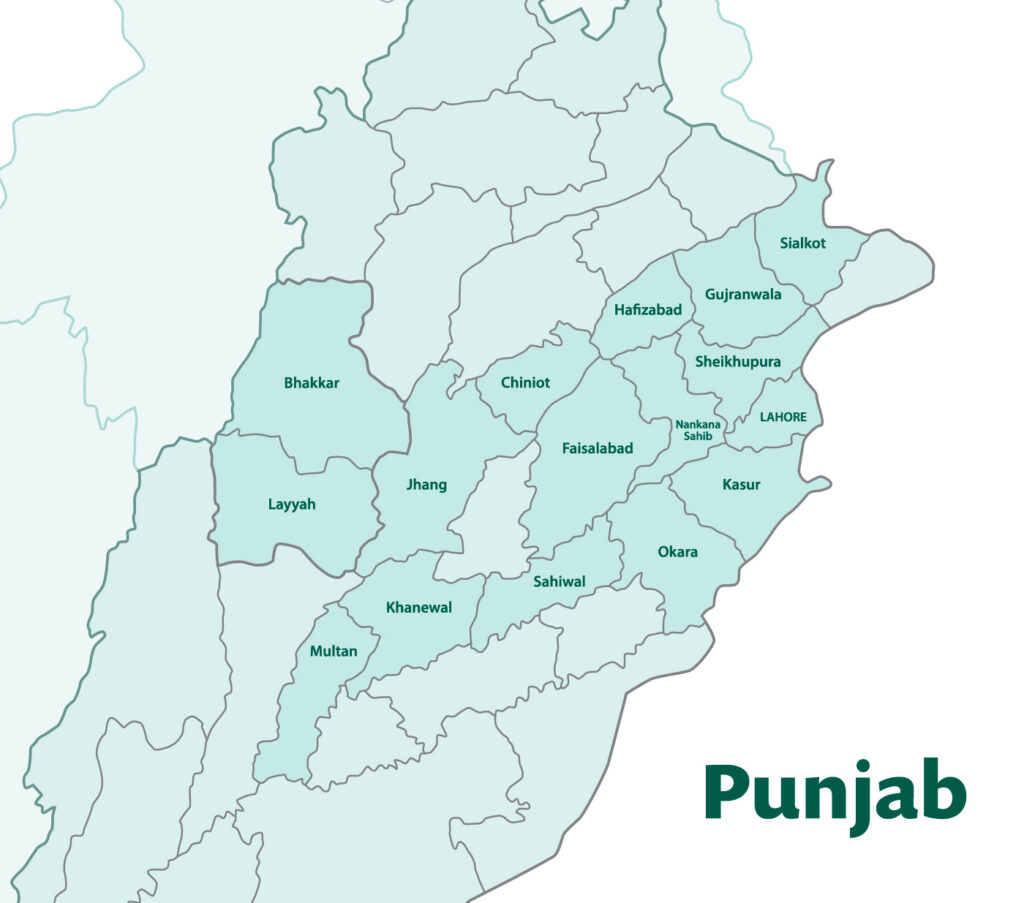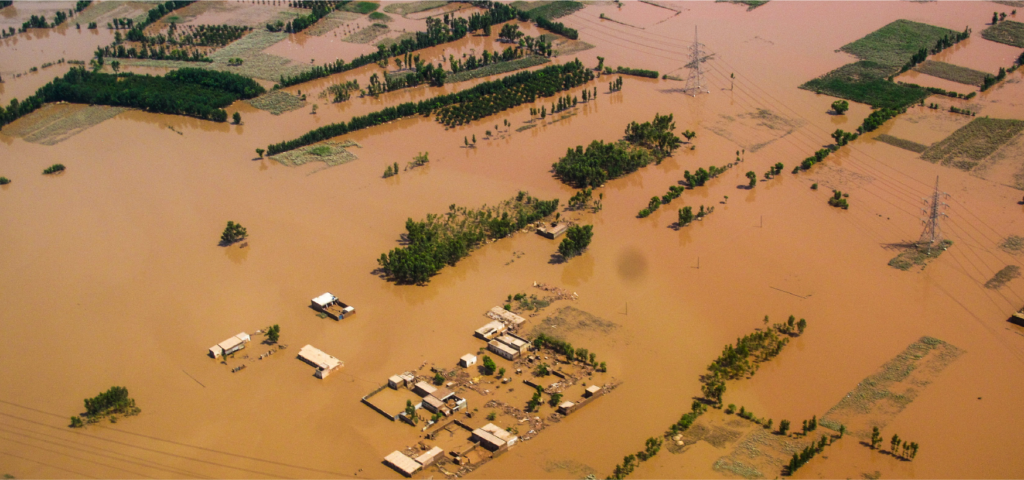Disease, Heat, and Floods: Using digital services to mitigate new challenges to women’s livelihoods in rural Pakistan
- October 14, 2022
- 10 minutes read
When disease and a heatwave, followed by devastating floods ravaged Pakistan’s Punjab province, PxD’s LMAFRP digital information service, which we implement in partnership with the Rural Community Development Society (RCDS) with support from the International Fund for Agricultural Development (IFAD), assisted women livestock farmers navigate new and unprecedented challenges. This International Day of Rural Women, we highlight the important role women play in Punjab’s rural farming economy and our work to promote information to enhance more productive and resilient livelihoods.

Introduction
Livestock husbandry and livestock-related products (dairy, meat, leather goods, etc.) constitute an important sub-sector of Pakistan’s agriculture sector: Pakistan is the fourth largest milk-producing country in the world1Sattar, Abdul, “Milk Production in Pakistan” PIDE Blog, pide.org.pk/blog/milk-production-in-pakistan , and the share of livestock products in the generation of foreign exchange is approximately 13%2Government of the Punjab, “Livestock Contribution” , livestock.punjab.gov.pk/livestock-contribution. As is the case in many smallholder economies, in Pakistan, women are largely responsible for the care of livestock and for the production of many livestock-related products, particularly dairy3Ibid..
In rural areas, livestock plays an outsize role in livelihoods, with the Punjab provincial government estimating that “livestock is an integral part (30-40%) of the livelihood of about 30 to 35 million rural farmers”4Ibid.. Livestock-related products, such as butter, eggs, meat, and animal fats (oils), contribute important nutrients for all households – rural and urban – and play a critical role in meeting the nutritional needs of rural children. Further, livestock contribute an important source of continuous income which can sustain poor rural households between seasonal crop-related revenues, and insulate them from shocks5Ahmad, Tusawar Iftikhar and Tanwir, Farooq, “Factors Affecting Women’s Participation in Livestock Management Activities: A Case of Punjab-Pakistan”, mpra.ub.uni-muenchen.de/93312/1/MPRA_paper_93312.pdf..
For these reasons and more, supporting the development and improvement of livestock farming can have a considerable impact on improving the livelihoods of Pakistan’s rural population, and can impact the livelihoods and status of rural women. We believe significant gains can accrue to rural farming families through the promotion of best practices to women. Improved practices can improve yields and minimize losses, leading to increases in income from livestock farming.
Many rural women are unaware of best practices that can optimize outputs associated with livestock, and access to information and economic opportunities can be constrained by cultural and geographic barriers. As documented elsewhere on this blog, digital extension services offer cost-effective and easily scalable solutions with very low marginal costs. In rural Pakistan, where many women rarely leave their homesteads, the portability of digital information offers additional advantages for navigating geographically and culturally hard-to-reach spaces.
Geographic and cultural constraints to attending in-person RCDS livestock training sessions were exacerbated by social distancing introduced to mitigate the COVID-19 pandemic. RCDS’s in-person activities were suspended in the initial months of the pandemic, but the utility of advisory information increased as rural households navigated new challenges in a time of escalated economic stress. It was at this time that RCDS and PxD initiated a partnership to deliver advice to livestock-rearing women in rural regions of Punjab province in Pakistan. This collaboration, supported by IFAD, provides customized and actionable digital information to livestock-rearing women. Combining PxD’s experience in delivering digital extension services to Punjabi farmers and RCDS’s extensive local knowledge and expertise, the service draws on demographic insights, and cultural practices to deliver information that is accessible, comprehensible, and actionable for recipients.
The resultant digital advisory service has proven to be an effective, cost-efficient, and scalable supplement to in-person training, and is now extended in the absence of COVID-19-related social-distancing constraints. The service demonstrated new advantages when unfamiliar disease- and climate-related threats subsequently impacted rural households.
The Service
RCDS’s experience and local trust in their services have been integral to the success of the initiative. Over the past two decades, RCDS has partnered with local, federal, and international institutions to build a significant rural network to promote and implement development programs to assist poverty-stricken segments of society in rural areas of Pakistan.
Advisory content was developed in partnership with local livestock consultants who were well-informed about local livestock issues and output-increasing best practices. The advisory information distributed by the service covers a wide array of topics, including disease identification, information about and access to vaccinations, disease prevention and remedies, practices to increase milk yields, and guidance on protecting livestock against climate-related shocks.

After conducting a baseline survey to systematically understand the informational needs of women farmers in four districts in Punjab, and the development of advisory information, PxD piloted digital services among 3,160 rural women associated with RCDS. The four districts, in which the pilot was concentrated, are among the poorest districts of Punjab, all of which are located in the south of the province. Given the success of the initial pilot, the service has subsequently been expanded to more than 50,000 livestock-rearing women in 16 rural districts of Punjab.
One of the key components that PxD assessed during the initiative was the extent of knowledge retention by participating women after they received the advisory. Pilot testing in the early stages showed that the advisory information was not only useful but was also retained for a significant period after it was delivered.
RCDS maintains a dataset of women who have either attended in-person sessions of livestock advisory or shown an interest in livestock advisory or have taken a microfinance loan for livestock farming. This data, and its quality, were instrumental in helping PxD deliver the advisory directly to the women via their phones. Furthermore, the data also contained the districts in which each woman resided. This was used to help decide in which of the two local languages – Punjabi and Saraiki – the advisory would be conveyed.
Advisory information is delivered through a voice call. A text message is sent 24 hours before the call to alert users that they should expect a call the next day. This is done to ensure that the advisory is received by women. A barrier highlighted by the baseline survey was limited access to mobile phones on the part of women in the region. Cultural and financial constraints make it far more likely that men have primary access to cell phones. Hence, the time allotted for the voice calls is set at a specific hour in the evening, so that the call is received in the evening when the family is no longer busy with agricultural activities, men are more likely to be home, and when family members can collectively listen to the advisory in their homes.
The voice call has local cultural music layered in the background, to assist the participant in developing trust in and comfort with the message. The information is delivered in the local dialect – Punjabi or Saraiki – to enhance understanding of and familiarity with the recorded message. Further, listeners are told that the advisory is from RCDS since it is well-known as a trusted organization in these regions. As a general protocol, to improve pick-up rates when the voice call is unanswered, another call is placed after a 15 to 30-minute interval.
Lumpy Skin Disease
A significant advantage of digital extension is the ability to send timeous information. This is particularly valuable to address and prevent viral diseases that can have a drastically negative impact on the well-being of the livestock.
In April 2022, Pakistan saw a viral outbreak of lumpy skin disease in cattle. The disease was transmitted between cattle via blood-feeding insects. The disease has a high virulence and fatality rate and killed thousands of cattle in the country.
A significant hurdle that seriously hindered timely prevention and actions to curtail the impacts of the infestation was the lack of baseline knowledge and awareness of the disease. Moreover, misinformation was rife, with misplaced rumors about negative effects of vaccines abounding. Many people mistakenly believed that it was the vaccines that were causing deaths among animals, when animals that had died were either already infected with lumpy skin disease, or were generally sick and should not have been vaccinated at the time.
Understanding these knowledge gaps, PxD and RCDS collaborated to provide timely information about the infestation. Initial infections were observed in the southern part of the country and slowly spread north towards Punjab province, where our users reside. PxD started providing information about lumpy skin before the disease had become widespread in the province.
Our farmer-users were given information about the disease and its virulence, how it is spread, and traditional preventative measures. Following that, to increase the survival rate of infected cattle, users of the service were advised to vaccinate their cattle as soon as vaccines became available. Participants were also informed about how to identify early signs of the disease on the animal.
Anecdotal feedback received by RCDS in the field suggests that the messages were very useful. Users with whom PxD surveyed reported that in many instances they were able to avoid fatal infections in their animals due to timely vaccines, even if their animals did get infected.

The Floods
In the summer of 2022, Pakistan witnessed firsthand the severe impacts of climate change. In March and April, the country experienced a crippling heat wave, followed by a record-breaking monsoon season in Punjab, Sindh, and Balochistan spanning June, July, and August. An unparalleled monsoon, coupled with unprecedented melting of glaciers in the north due to the initial heatwave, led to extreme flooding in rivers that flow from the north of Pakistan to the south. The floods are estimated to have impacted at least one-third of Pakistan, including the livelihoods of 33 million people.
Prior to the floods, the extreme heat waves had contributed to a general belief that floods were imminent. To counter the threat, the PxD team in Pakistan worked with RCDS to preemptively identify areas prone to flooding, and prepare advisory messages with useful information about managing floods, and adaptive strategies to protect assets and livelihoods.
A major problem with livestock is their slow mobilization, making them and their rearers prone to becoming flood victims. Timely warnings and regular updates via voice call advisory messages provided participants with information for ensuring the safety of their livestock during the floods. PxD and RCDS made use of their existing program to deliver instructions, warnings, measures, and assistance via voice call messages, to inform participating women and their families about floods and ways to protect themselves and their livestock.
Meeting today’s challenges
The advisory service designed by PxD, and delivered in partnership with RCDS, provided an effective method to deliver timely information to livestock farmers. Due to its effectiveness in the regions where it was being delivered, the advisory service was extended to address other unforeseen challenges, such as the virulent lumpy skin disease, and flooding.
In addition, our project has demonstrated the core strengths of digital communication: it is cost-effective, scalable, and capable of reaching regions and communities that are disconnected or hard to access due to difficult terrain, long distances, or cultural constraints.
Our advisory content was designed to deliver information in a manner that does not require the recipient to have prior knowledge, or education to understand the subject. The use of familiar dialects and carefully crafted messages made the information accessible, easy to understand, and ultimately very effective.
PxD aims to further extend the benefits of digital communication to support other low-cost interventions among rural communities of Pakistan. More specifically, feedback received from users has prompted PxD to further our partnership with RCDS to envisage interventions to support digital veterinary services. We are motivated to continue to harness the power of digital communication to facilitate more productive and resilient livelihoods in rural communities of Pakistan.

Stay Updated with Our Newsletter

Make an Impact Today



